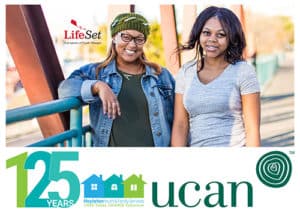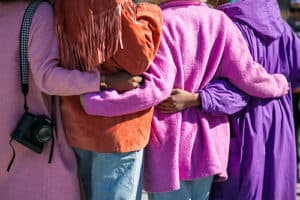LifeSet Pilot Program at Hoyleton and UCAN Helping Youth Successfully Move into Adulthood

A three-year pilot program in Southern Illinois is helping CHHSM members meet the needs of youth in their care. Hoyleton Youth and Family Services in Fairview Heights, Ill., and UCAN in Chicago are participating in LifeSet, an intensive hands-on, youth-driven approach to helping young people in the child welfare system transition into successful adulthood.
LifeSet is a program of Youth Villages, a Memphis-based nonprofit that provides help for children and young adults across the United States who face a wide range of emotional, mental health, and behavioral struggles. An individualized, evidence-informed, community-based program, LifeSet helps youth in transition to adulthood gain greater agency over their life choices, thus creating positive futures. It kicked off in March 2020 in Southern Illinois.
The program stipulates that LifeSet specialists meet weekly with youth, so staff from UCAN and Hoyleton were trained as specialists. Caseloads are limited to just six youth, and the weekly meetings help build rapport. With guidance from the specialist, the youth participants set monthly goals, assess their progress and make changes as necessary to their goals.
Chris Cox, president and CEO of Hoyleton, says the youth-centered, intensive support has made all the difference. Participants have to be at least 17-1/2 years old to be part of the program, and Cox says that creating the opportunity for them to be part of decisions regarding their own future is an empowering experience.
“Moving away from a brick-and-mortar institutional environment to one where young people have a say in where they live and make their own decisions — along with the guidance of their specialist — helps them become more engaged in the process, with a greater sense of ownership of their future,” Cox says. “Without such a program, there is no learning money management, or learning how to take care of themselves.”
Cox says the small caseload for the specialists is key, especially because COVID-19 cut off many avenues of support for youth in the state welfare service. Thanks to the program, “the youth are starting to trust,” he says. “In surveys, young people are identifying with this new staffing model. They are developing trusting relationships. For the first time, they feel they have an advocate.”

While Hoyleton juggles clients from both rural and city locales, UCAN deals with Chicago youth and young adults. But UCAN’s data agrees with Hoyleton’s assessment of the program. The most recent annual review of LifeSet at UCAN data showed an increase in the long-term reduction in young adult arrests, increased community connections for the youth, plus increased stability in employment, vocational choices, and housing.
Feedback from program participants also has been positive, says Nichelle D. Simmons, director of program support for UCAN’s Teen Parenting Service Network, with youth consistently mentioning the support they receive from their specialist. One youth remarked that she “enjoys becoming more independent, and the staff are supportive.” Another said that she liked her specialist and the weekly check-ins.
The accomplishments from the program also strongly shape a youth’s direction. One UCAN participant said that because of the program, her confidence has increased. She noted that she is becoming more independent and has been accepted into a four-year university.
Some of the UCAN participants are young parents, so LifeSet specialists help them improve their parenting skills. Additionally, “UCAN’s Teen Parenting Service Network meets quarterly with the [Illinois] Department of Child and Family Services and LifeSet providers to discuss points of collaboration, comprehensive service delivery, and discharge planning for pregnant and parenting youth in the LifeSet program,” says Simmons.
Since 1999, more than 18,000 young people across the country have been helped through LifeSet. A large, randomized controlled trial conducted by national social research firm MDRC showed that LifeSet decreased homelessness, increased economic well-being, increased mental health, and decreased domestic or partner violence.
The Southern Illinois pilot program originally was slated to end after 2022, but Cox says the Illinois Department of Child and Family (DCFS) services — the lead funding agency — “is looking to expand the pilot program past the third year, and to bring in new agencies.”
“UCAN and Hoyleton are UCC and CHHSM members, and are on the cutting edge in terms of innovative programs geared to helping young people find success when they age out of child welfare,” says Cox.

The willingness of the Illinois child welfare system to adopt a forward-thinking approach in implementing LifeSet also has created a win-win scenario for the agencies and the young adults. “I’m really pleased and excited that the state child welfare system recognizes that we have a greater obligation to young people aging out of the system,” adds Cox. “Illinois DCFS agreed to test pilot this new and innovative program and, as a result, we’re building new relationships between private and public sectors that we haven’t had in the past.”
These relationships are especially important as agencies work to find ways to respond to needs generated by the COVID-19 pandemic. “It’s extremely important for our faith-based partners and the state child welfare system to find new and innovative treatment models. We need to continue to evolve in our work to meet our community’s needs,” says Cox.
COVID’s impact on children and families has been devastating, he adds. “We had 16,000 young people in the system at the beginning of the year, and that grew to 21,000 by year’s end. We’re budgeting for 27,000 children this coming year, due in large part to the epidemic.”
“Because of COVID, even more children and families are struggling, and the need for our social systems’ safety net is more important than ever,” Cox says. “Our faith-based organizations have always stepped up, and it’s important to continue to use this time as an opportunity to evolve innovative programs like LifeSet, with new techniques and best practices.”
Join Our Mailing LIst
"*" indicates required fields
Follow on Facebook
Rennie Named President and CEO For EHM Senior Solutions - CHHSM
www.chhsm.org
Kari Rennie has been selected as the new president and CEO of EHM Senior Solutions, based in Saline, Mich. With more than 15 years’ experience, Rennie brings a diverse skillset and strong focus on r...